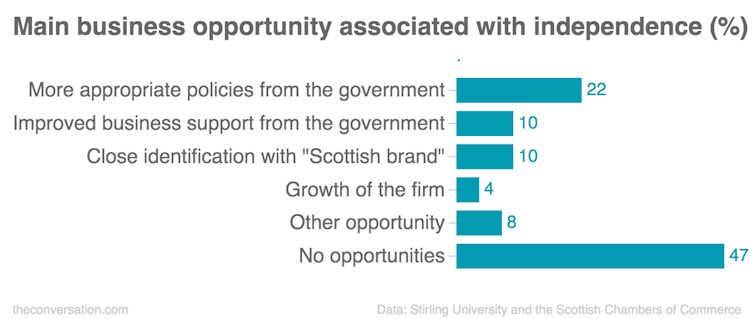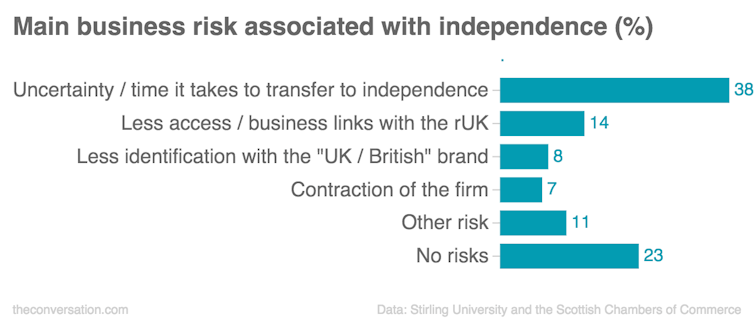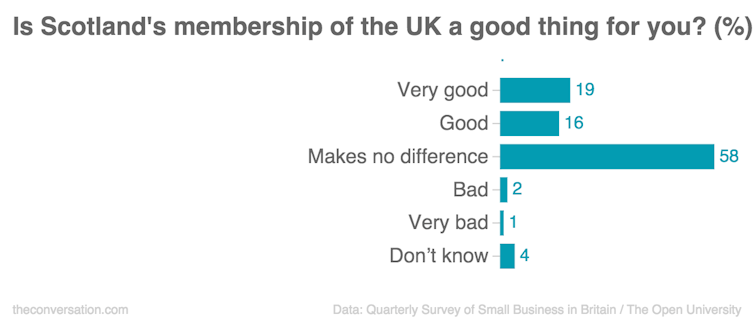We have heard a lot about the implications of independence for Scottish business. According to the latest government statistics Scotland has 340,840 micro, small and medium-sized businesses, representing 99.3% of its private sector enterprises. So the outcome of the vote will clearly have a significant impact on the Scottish economy.
But what do the people who run the 4.8m SMEs across the rest of the UK think about an independent Scotland? The decision rests with the Scottish people but, as the commentator Jonathan Freedland has pointed out: “Just because it’s their choice doesn’t mean the rest of us are not allowed a reaction.”
The view from Scotland
Opinion remains divided within Scotland’s business community. In May, a large membership survey by the Scottish Chambers of Commerce yielded interesting findings on the main perceived risks and opportunities of independence.

While more than half (53%) of respondents identified a way their business could benefit, 47% selected “no opportunities”, a sentiment that the authors describe as “particularly acute” amongst those trading mainly with the UK.
Meanwhile, the most commonly-cited risk was uncertainty (38%), yet almost a quarter (23%) did not identify any risks for their businesses.

Argument has raged over the consequences of a Yes vote for particular industries within Scotland. On August 27 2014, 130 chief executives, board members and entrepreneurs penned a widely-reported open letter to The Scotsman in support of the Union. The next day, another letter appeared in The Herald, in which 200 similarly distinguished business leaders made the case for independence. However, much less attention has been paid to the implications for businesses in England, Wales and Northern Ireland.
Contrasting UK-wide views
Some have argued that independence would benefit businesses and communities in the rest of the UK. For example, Professor Nathu Puri, a co-signatory of the pro-independence letter, states:
Scottish independence will be a major step forward towards that goal [of rebalancing the British economy] in the interests of not just Scots but business and jobs in Wales, Northern Ireland, the Midlands and the north of England.
Others remain more sceptical. A recent report by the UK Parliament’s cross-party Business Innovation and Skills Committee raises concerns around trade, EU membership, tax and regulation. It asserts:
The benefits to business of a single UK market should not be underestimated.
The CBI’s response to the Scottish Government’s 2013 White Paper on Independence also highlights the, “highly interconnected” nature of the UK’s constituent nations. It concludes that breaking up this internal market would increase costs for businesses and consumers, citing as examples the need to create new cross-border arrangements in relation to issues like tax, employment and company pensions.
SME data
So what do SME owners and managers really think? We researched their views on the implications of independence as part of a forthcoming Quarterly Survey of Small Business in Britain study. During July and August we collected a total of 225 responses from our online panel, a modest but broadly representative sample in terms of firm size, sector and region.
Rather than seeking personal opinions on the prospect of independence, we opted for a more concrete, business-specific question as a better indicator of the practical importance of this issue. More than half (58%) thought that Scotland’s membership of the UK made little difference to their own business.
This result suggests lower levels of concern than those reported in a BCC membership survey (published in May), where 85% of respondents stated that Scotland should remain within the UK. However, it does leave a sizeable minority (35%) who see Scotland’s membership of the UK as having a significant – either “good” or “very good” – impact on their business.

Underlying reasons
In order to probe for underlying reasons, we asked respondents for practical examples to show how Scotland’s membership of the UK had an impact on their own businesses. Comments from rUK firms who see Scotland’s membership as a “good thing” highlight three main concerns.
One is potential barriers to cross-border trade: “We trade to a significant degree in Scotland. Anything that makes this harder would potentially be negative.” Another business-owner commented: “I would hate to add any complexity to my Scottish sales. I sell a lot to Scottish buyers … Scotland leaving worries me a lot. I think it will be a disaster.”
There is also the concern that transaction costs will be higher as a result of an independent Scotland: “The prospect of having to treat deliveries to Scotland as exports horrifies me, especially if Scotland does not continue as a member of the EU.”
And many just have a general sense of uncertainty about how an independent Scotland will affect their business: “We need stability. Any large upheavals will produce uncertainty and interrupt workflow. Splitting up the UK will be a nightmare and we will be poorer for the split.”
Another said: “[Our] pensions are held in a group scheme headquartered in Scotland. Were Scotland to break away the fund would have to be split, with the possibility that economics of scale fall for both sections. It would be lose-lose.”
Scottish business owners in this sample also referred to cross-border trade and currency: “Most supplies come from outside Scotland. Currency union and lack of trade restrictions are absolutely necessary.”
Scotland’s decision to be independent or part of the UK is an important issue to many small and medium-sized businesses within Scotland and in the rest of the UK. The data suggests that concerns may not be as high as some believe or have reported. But, with more radical devolution waiting in the wings, these firms are likely to face some interesting challenges, whatever the outcome of the referendum.
Hard Evidence is a series of articles in which academics use research evidence to tackle the trickiest public policy questions.

